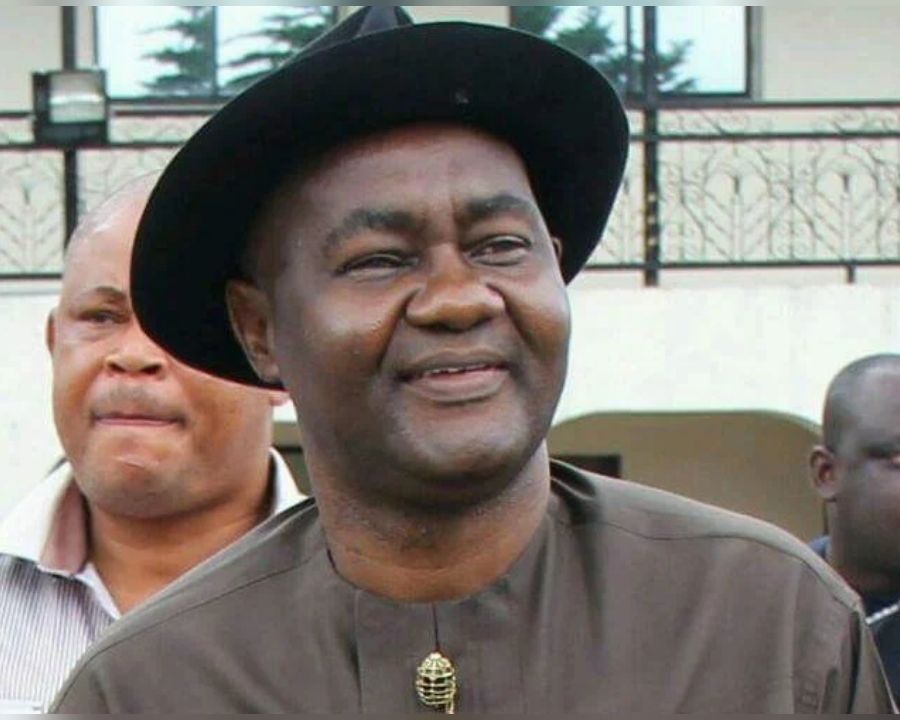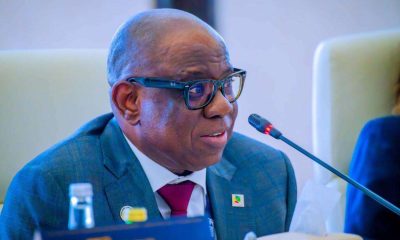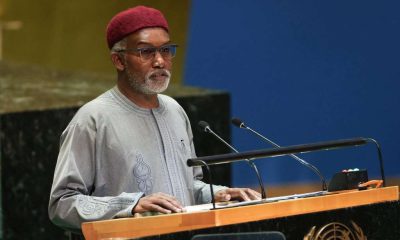Nation
Budget 2024: Worsening health sector crisis belies 5% allocation

By Tumininu Ojelabi Hassan
The 2024 budget recently presented by President Bola Tinubu in which about five per cent of the N27.5 trillion was appropriated to the health sector is below the expectations of Nigerians, considering the critical state of the healthcare system, which has been in deep crisis for years resulting in the mass exodus of professionals from the sector.
From its total N1.33 trillion allocation, representing 5 per cent of the total budget, N1.07 trillion was earmarked to service recurrent and capital expenditure of the Federal Ministry of Health and Social Welfare and its agencies. About N137.2 billion was set aside for GAVI (the Vaccine Alliance) Immunisation funds, and counterpart funding for donor-supported programmes; while, N125.7 billion would serve as the Healthcare Provision Fund.
Unfortunately, the 2024 budget with the theme, Budget of Renewed Hope, is a continuous pattern of underfunding the health sector by previous administrations. Nigeria has never reached the 15 percent benchmark of the 2001 Abuja declaration in which African leaders pledged to commit 15% of their country’s total budget to the health sector.
The Nigerian Medical Association (NMA) disclosed that, of the 75,000 Nigerian doctors registered with it, more than 40,000,000 have left the country, with less than 30,000 left to provide healthcare services to more than 200 million people. This indicates a ratio of 1 doctor to over 10,000 patients as against the 1:600 recommended by WHO.
According to the Register of the General Medical Council, United Kingdom, about 1,197 Nigerian-trained doctors were licensed between May 29, 2023 and December 1, 2023, the total number of Nigerian trained doctors currently practicing in the UK is now 12,198.
According to the The National Association of Nigeria Nurses and Midwives (NANNM), over 75,000 Nurses and Midwives left the country in the last five years in pursuit of greener pastures.
Within one year, from April 1, 2022 to March 2023, 3,383 Nigerian-trained nurses and midwives were licensed to practice in the United Kingdom while 10, 639 nurses and midwives currently practice in the UK. This is based on a recent report from the Nursing and Midwifery Council (NMC), the regulatory body responsible for nursing and midwifery in the UK.
A report by WHO revealed that in 2020, 540 women and children per thousand died in Nigeria, making it the second-highest country with maternal and child deaths, after India with 788 deaths of women and children per thousand. In the same year, India accounted for 17 per cent of global maternal, neonatal deaths and stillbirths, while Nigeria accounted for 12 per cent.
Outbreaks of communicable diseases like malaria, tuberculosis, Lassa fever, yellow fever, and diphtheria are frequent infections due to the deteriorating state of the primary healthcare system especially in remote regions.
In an interview with our correspondent, Dr. Salmon Abeeb Oladapo, President, Association of Resident Doctors (ARD) LASUTH, who shared his thoughts on the 2024 budget appropriated to the health sector, opined that N1.33 trillion was insufficient to fix the issues in the health sector, stating that the 5% of the total budget allocated to the health sector is non-adherence to the 2001 Abuja declaration, and a proof of the government’s lack of regard for the health sector.
“There was a conference tagged ‘Abuja declaration,’ which happened in 2001. A meeting by the African union which stated that for any African country to have a good healthcare system, 15% of the budget should be allocated to health. What was appropriated to the health sector is just 5%, instead of the agreed 15%. This disparity proved that the health sector is not regarded and we know that health is wealth. If the Nigerian government is serious and they want people to have good health, they can do better,” he said.
“Recently, the House of Representatives advised the federal government to declare a state of emergency in the health sector. They advised Nigerian government to put more votes into health, meaning to appropriate more funds into health. It means Nigerians aren’t even listening to Nigerians. The House of Representatives are the ones advising the executive and you can see what the executive has brought forward. They have submitted the budget to the House of representative and let us see if House will be bold enough to tell them that this 5% you have voted for health is inadequate and can’t translate into meaningful health to Nigerian citizens. The second point is that, recently, there was a health summit in Abuja, it is more or less like all the commissioners for health and other stakeholders had a meeting in Abuja.
“Most of the time”, he said, “where Nigeria roll out their budget, we are trying to see how effective our budget is and how it can be monitored. Then you will realise that you can’t monitor it. This amount of money that was appropriated will not be duly followed to the latter. There is a difference between a proposed budget and actualizing the content. That is where the problem is, yet you would say Nigerian doctors, nurses are traveling out. Yet you will tell me healthcare workers aren’t happy, why will they be happy? We are sitting on a keg of gunpowder, this keg of gunpowder can explode at any moment,” he stated.
He decried the mass exodus of Nigerian doctors, adding that the Brain drain poses more damage to the health sector, thereby increasing the chances of quacks and scammers to penetrate the sector.
“The rate at which Nigerian doctors are leaving will make people to start patronising people involved in alternative medicine, thereby causing more harm. You will see a lot of quacks and scammers, who will continue to scam people all in the name of I have a product that can do everything.
He said the rising cost of drugs and treatment in the country, is due to the foreign exchange rate crisis, which has consequently resulted in hike in prices of instruments, consumables and increase in market demands.
“Most of the manufacturers of drugs are foreigners and majority of them are leaving, they could not cope with market demands while some still need assistance from the government. In the hospital we have the management, doctors that are working, health workers and infrastructures, if you want to buy any instruments now, prices aren’t stable due to the fluctuation of the dollar to naira ratio. Another reason is the amount they are selling consumables, and we have to buy them. Everything has become exorbitantly high, the only thing yet to change is the salary of civil servants.
In an interview with our correspondent, Mr. Oloruntoba Odumosu, the State Secretary, NANNM Lagos Council, opined that N1.33 trillion budgetary allocation for the health sector is absolutely below the expectations of health workers from the present government, adding that the budget gives little room for significant infrastructural development in the health sector.
“It completely betrays our expectation from the present administration, from the fact that other policies like the removal of fuel subsidy, floating of Naira have already deepened the misery of Nigerians. The excuse we were giving those times was that some of these funds cut back from sponsoring fuel subsidy will be used to finance the education and health sector. A budget of N1.33 trillion, which already has over N1 trillion as overhead cost gives little room for any serious infrastructural investment given the circumstances within the health sector.
“More people will want to leave, because the budget is a reflection of the priorities of the government. Based on the agreement of African countries and UNESCO recommendations for education, we should be talking about 15.26%. What they have budgeted shows clearly that the priority of the government is not on health neither is it on education. With the level of poverty being reported by government agencies themselves, you can imagine what would happen to the citizens of the country when government is cutting back on financing critical social sectors like health and education,” he said.
He called for the declaration of state of emergency in the health sector, while noting that privatisation of public health facilities is not the solution needed to fix the enormous problems impairing the healthcare system, instead the government should focus on closing the infrastructural gaps as well as resolving the human resource issue in terms of recruiting enough manpower and proper renumeration of the manpower.
Last week, the National council of health meeting was held in Ado Ekiti, it is the highest policy body within the health sector of the federation. The communique made it clear that there are serious manpower issues, human resource for health issues, infrastructural gaps in terms of funding.
However, what betrays our expectations is that in some of this recommendations, it never spoke about increment in budgetary allocation. Some of the things stated there was public-private partnership arrangement which of course we know that with the current level of poverty, privatasing health facilities or making private interest become dominant force within the health sector will not bring about any improvement in our health indices.
“Health financing is the key aspect of being able to have vibrant and responsive and accessible healthcare systems. Following the passage of NHIA Act Of 2022, there is a need for the federal government to prioritize the implementation of it.
There are still so many gaps in terms of how different actors within the system would be able to work in that particular axis. Federal government must prioritize the implementation of health policies but critical stakeholders must continue to be consulted even in this implementation plan. One of the issue is that while certain policies which are supposed to help the sector move forward come up, sometimes the implementation process is dominated by a particular class of health professionals that will exclude the contribution of others and of course those kind of policies will already reduce the chances of those who policies subdue.
If we are able to implement that, we can move from the present situation of having most of the healthcare expenditure being out of pocket to at least the full system that will ensure that healthcare is evenly distributed.
The Association of Nigerian Health Journalists (ANHEJ) has criticised the appalling allocation of N1.33 trillion, stressing the need for Nigerian government to adequately fund the health sector.
At the 7th Annual Conference of the Association, Joseph Kadiri, ANHEJ President explained that with the N1.33 trillion allocation, Nigeria is very far from achieving the ‘2001 Abuja Declaration.
The conference with the theme ‘Health Security: Nigeria’s Effort to Achieve Universal Health Coverage, was organised in collaboration with the World Health Organisation in Nigeria
Kadiri said that with the emerging and re-emerging epidemics and pandemics, it is paramount for the government at all levels in the country to prioritise and adequately fund health security.
In addition, he urged the Federal Government to appropriate more funds to the health sector, fully implement the Basic Healthcare Provision Fund (BHCPF), and make healthcare services accessible.
On the other hand, the Federal Capital Territory Administration (FCTA) says the 2024 budget will lead to 61 per cent improvement in FCT’s health sector and reduce brain drain.
Dr. Adedolapo Fasawe, the Mandate Secretary, Health and Human Services Secretariat of the FCTA, revealed this at the 2023 Association of Resident Doctors (ARD), FCT Chapter Health Week in Abuja.
Fasawe stated that the N1.33 trillion budget would give rise to infrastructural development in the FCT health sector and will improve the well-being of doctors and health workers.
“The budget is an increase over the last budget. We believe this will translate to a 61 per cent increase in our health indices, better equipment in our hospitals, and we will be able to employ more doctors. For every doctor who leaves the system, we replace the person.
.As people leave, we also have people looking for jobs. Most people leave not because of poor salaries or poor working conditions, but because they don’t have the right equipment to work with at times. We hope the ‘Japa syndrome’ will reduce with the improved budget; we also hope to see the right equipment and expansion of hospitals and better roll-call,” she said.













